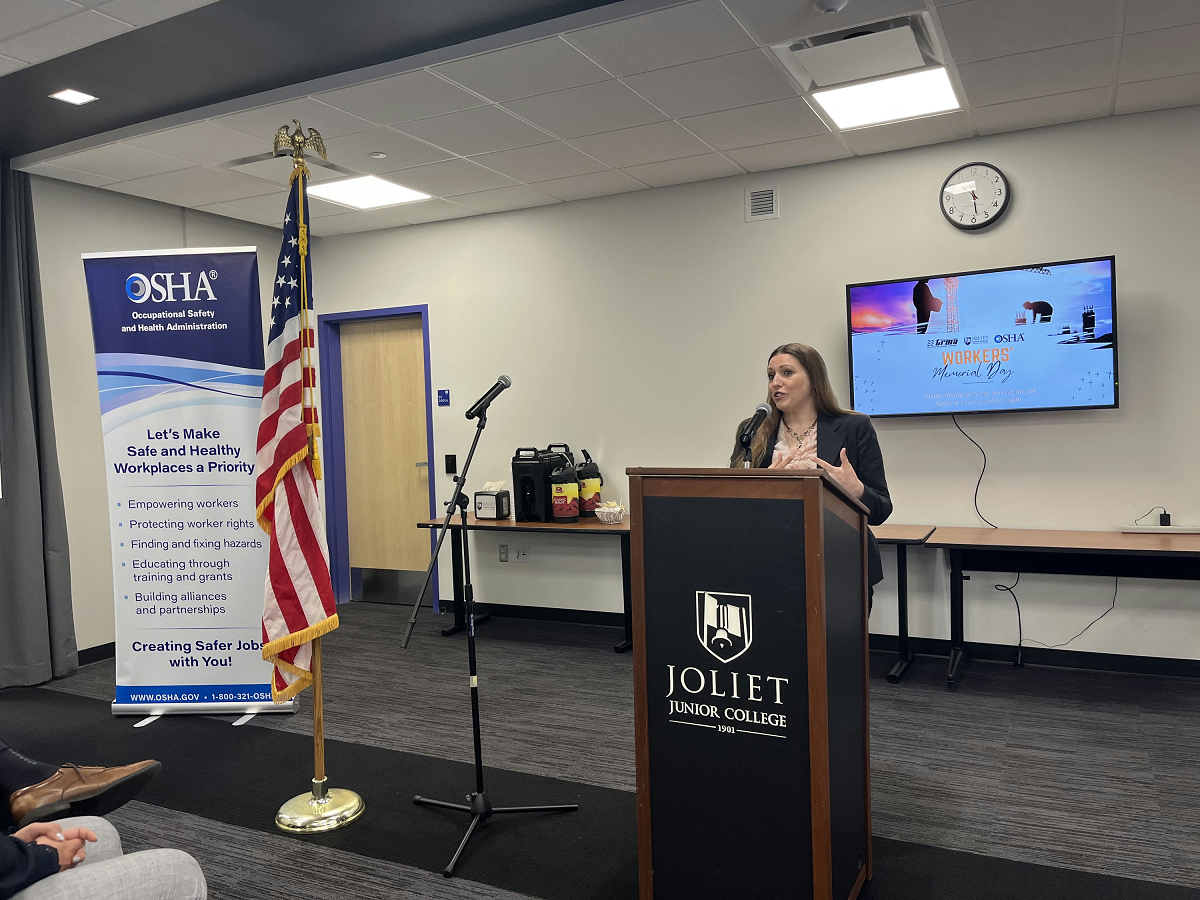Ventura highlights workplace safety on Workers’ Memorial Day
- Details

JOLIET – State Senator Rachel Ventura, along with prominent workers’ rights advocates and Three Rivers Manufacturers’ Association, came together at Joliet Junior College Friday to promote and highlight the importance of improving workplace safety and honor those who have been injured or killed from workplace accidents.
“It’s essential to practice safety in the workplace to prevent these injuries and deaths. Every person deserves a safe work environment, and employers need to be diligent in following the rules in place,” said Ventura (D-Joliet). “As a member of the Warehouse Safety Task Force, I recognize the efforts that the state is making to improve safety in Illinois and encourage all employers to regularly update and educate their workers on workplace safety.”
Ventura recently passed a resolution in the Senate to declare April 26, 2024 as Workers' Memorial Day in Illinois. Senate Resolution 895 encourages all employers to reaffirm their efforts toward improving workplace safety and serves as a day of remembrance and action for workers killed, disabled, injured, or made unwell by their work. Additionally, it strives to seek stronger health standard enforcement and treating workers with dignity as constant improvements in worker safety are pursued.
Ventura joins state legislators to promote Healthcare Protection Act
- Details
NEW LENOX – State Senator Rachel Ventura joined Governor Pritzker and several state legislators at Silver Cross Hospital Wednesday to discuss the importance of the Healthcare Protection Act.
“I previously worked at an insurance company, which showed me firsthand how they prioritized profits over providing actual care,” said Ventura (D-Joliet). “The Healthcare Protection Act would end this practice of insurance companies putting profits above people and, more importantly, would stop insurance companies from practicing medicine without a license.”
Ventura passes resolution to declare Workers’ Memorial Day in Illinois
- Details

SPRINGFIELD – To promote and highlight the importance of improving work place safety and honor those who have been injured or killed from workplace accidents, State Senator Rachel Ventura championed a resolution to declare April 26, 2024 as Workers' Memorial Day in Illinois.
“Despite regulations in place like the Occupational Safety and Health Act, thousands of dedicated workers across the country are killed, disabled or severely injured by occupational diseases or workplace injuries every year,” said Ventura (D-Joliet). “It’s essential to practice safety in the workplace to prevent these injuries and deaths. Every person deserves a safe workplace as a fundamental right, and employers need to be diligent in following the rules in place.”
Senate Resolution 895 encourages all employers to reaffirm their efforts toward improving workplace safety and serves as a day of remembrance and action for workers killed, disabled, injured, or made unwell by their work. Additionally, it strives to seek stronger health standard enforcement and treating workers with dignity as constant improvements in worker safety are pursed.
Ventura to tackle deteriorating roads with out-of-state cargo transportation fee
- Details

SPRINGFIELD – To address crumbling roads in some of the district’s most traveled areas, State Senator Rachel Ventura is leading a measure that would impose a fee on interstate carriers with the collected fees going toward maintenance and repairs of roads most affected by heavy transportation travel.
“My district has one of the biggest transportation hubs in the state and has had ongoing issues with highway infrastructure due to heavy trucking,” said Ventura (D-Joliet). “Far too often, the 43rd District is left with the burden of fixing reoccurring pot holes and damage due to the lack of tax dollars from local sales since these trucks often sell goods from elsewhere. This fee would address that issue by directly funding new projects to help fix the roads that need it the most.”
Senate Bill 2784 would impose a cargo fee on each semi-truck that transports tangible personal property. The fee that will be imposed on carriers would vary between $0.50 and $8 per vehicle depending on weight.
More Articles …
Page 41 of 62






